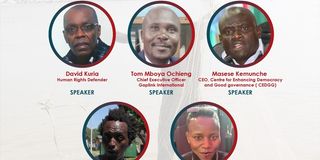X Space discussion reveals deeper issues in Lake Nakuru fishing menace

X space poster held on Thursday, January 30, 2025.
A week-long protest in Kivumbini Ward has left residents and local leaders grappling with the forceful arrest of Brian Odhiambo by the Kenya Wildlife Service (KWS) due to alleged illegal fishing in Lake Nakuru.
In a bid to understand the broader implications of this disruption, Mtaa Wangu held an X-space discussion on the fishing menace in Lake Nakuru, bringing together a range of experts and locals who shared their perspectives and proposed potential solutions for the road ahead.
One of the listeners, @Mercymamboyote, a resident of Nakuru, expresses confusion over where the local community lost touch with KWS.
“There was a time when if the Park in charge was changed, and the community was invited to engage and stay informed about the new changes. Nowadays, that doesn’t happen anymore,” she says.
She also points a finger at civil society organizations for failing to engage with the local population effectively.
“Civil organizations need to do serious civic education and stop recycling the same people. At least bring in fresh voices. The people sent to us come with the same ideas and sometimes fail to reach the grassroots or share knowledge effectively.”
Masese Kemunche, CEO of the Centre for Enhancing Good Governance (CEDGG), emphasizes that Lake Nakuru is part of a national park, and its laws must be respected while identifying structural issues that hinder lawful fishing and access.
“Fish is a valuable resource, and there are those who will fuel animosity to avoid regulation. If we don’t regulate fishing, only those with deep pockets will benefit, while the small fishermen continue to suffer. Therefore, the media must help us continue this conversation to break the cycle of the resource curse.”
Dennis Kunga, a human rights activist and one of the speakers, insists on the release of Brian Odhiambo, regardless of his state. “KWS should return Brian to us, alive or dead—we just want our boy back,” he sternly says.
He adds that the threat of cancer from consuming toxic fish, as suggested by experts, isn’t as pressing as the immediate hunger crisis.
“People are dying from hunger, and that’s what government needs to address right now. If the fish isn't fit for consumption, it could be repurposed into fertilizer by setting up a plant to allow the community to benefit one way or another.”
If this can’t happen, he says that small farmers should be left to benefit from fishing just like an alleged syndicate of big players is currently doing.
Members of the Fourth Estate have also been challenged to broaden their focus beyond Odhiambo’s story and conduct a deeper investigation into the issue.
“Let’s not cover Brian alone, but instead conduct a deep dive into the broader problems at Lake Nakuru. Are people going missing because they’re fending for themselves, or has KWS turned rogue in their actions?” advises Purity Kinuthia, a Mtaa Wangu correspondent.
Her counterpart, Bret Sanya, emphasizes the need for a multi-sectoral approach, urging that all stakeholders be involved to find ways for the community to benefit.


